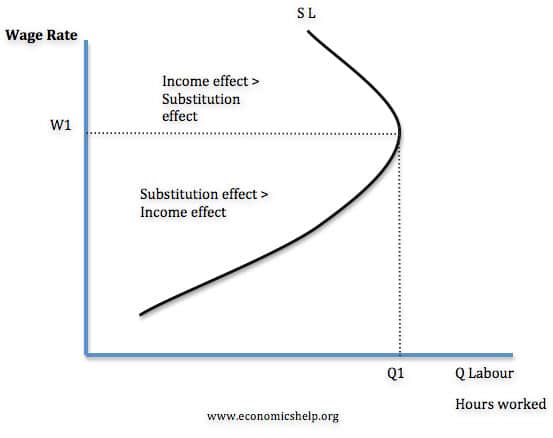If the price of a good increases, then there will be two different effects – known as the income and substitution effect.
If a good increases in price
- The good is relatively more expensive than alternative goods, and therefore people will switch to other goods which are now relatively cheaper. (substitution effect) –
- The increase in price reduces disposable income and this lower income may reduce demand. (income effect)
The substitution effect
This states that an increase in the price of a good will encourage consumers to buy alternative goods. The substitution effect measures how much the higher price encourages consumers to buy different goods, assuming the same level of income.
The income effect
This looks at how the price change affects consumer income. If price rises, it effectively cuts disposable income, and there will be lower demand for the good because of this fall in disposable income.
For example:
- If the price of meat increases, then the higher price may encourage consumers to switch to alternative food sources, such as buying vegetables.
- However, with the higher price of meat, it means that after buying some meat, they will have lower spare income. Therefore, consumers will buy less meat because of this income effect.
If a good like a diamond increases, there will be little substitution effect because there are no alternatives to diamonds. However, a higher price of diamonds will lower demand because of the income effect.
Income and substitution effect for wages

For a worker, there is a choice between work and leisure.
- If wages increase, then work becomes relatively more profitable than leisure. (substitution effect)
- However, with higher wages, he can maintain a decent standard of living through less work. (income effect)
The substitution effect of higher wages means workers will give up leisure to do more hours of work because work has now a higher reward.
The income effect of higher wages means workers will reduce the amount of hours they work because they can maintain a target level of income through fewer hours.
If the substitution effect is greater than income effect, people will work more (up to W1, Q1). However, we may get to a certain hourly wage, where we can afford to work fewer hours. In the diagram above, after W1, the income effect dominates.
It depends on the worker in question. If you are lazy and prefer leisure, higher wages will enable you to work less. The income effect will soon dominate. If you have a lot of debts and spending commitments, the income effect will take a long time to occur.
Income and substitution effect for interest rates and saving
Higher interest rates increase income from saving. Therefore, this gives consumers more income to spend, and spending may rise (income effect)
Higher interest rates make saving more attractive than spending, reducing consumer spending (substitution effect)
Related
- Giffen Goods – where higher price leads to higher demand because of the income effect of price rise, outweighs substitution effect.

